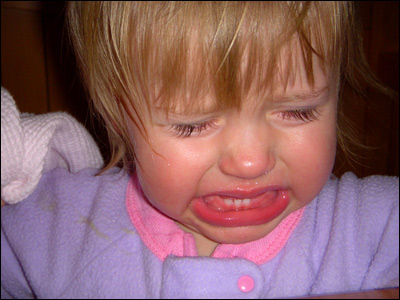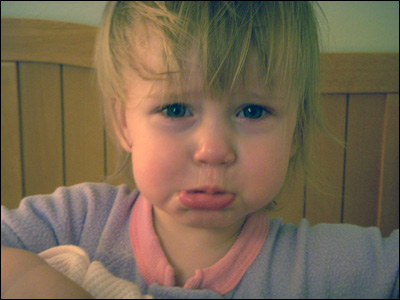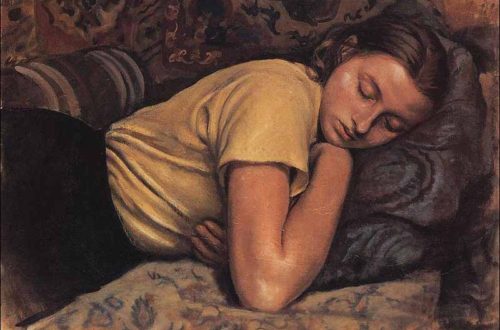
“You can never know. Not for sure – one gropes in the darkness and does the best one can – this incredibly humbling job of “parent.”
It grieves me to my core to hear my daughter cry.
I look at her tears and hear her plaintive sobs as she struggles to catch her breath amidst waves of wails, and it wrenches my very soul – I can describe it in no lesser terms. I would do almost anything to sooth her – to ease her anxiety and to take away the pain.
It seems I can do little, if anything. Standing there helplessly I want to cry with her but don’t. Her late night crying fits leave my nerves raw and exposed. The worst is that, despite my desire to be a good father, I feel so helpless in the face of this crying.
I can hear the advice of family and friends: “Rich, babies cry – that’s what they do! Don’t take it personally! And if you come to them whenever they cry, they never will learn to self-sooth and go to sleep by themselves. Let Julia cry it out; she will fall asleep eventually. It hurts her less to cry than it does for you to hear it. She will be fine! And she will grow out of this!”? So they tell me.
Maybe all this is true. But I cannot do it.
I tried to prepare myself for fatherhood in the way which has worked for me in other endeavors: I read a whole slew of books on the subject. But to my consternation the “experts” often contradicted themselves in offering advice. “The Happiest Baby on the Block” offered a special trick on how to sooth a baby’s cries, and Dr. Sears advises to go to your baby whenever it cries at night for whatever reason in the name of “attachment parenting.” On the other hand, “Babywise” by Gary Ezzo advises that babies learn to “cry it out,” similar to the “Ferber process” where children learn progressively to fall asleep without parental help. Not only did I read these books but I went online and read various critics and supporters of these approaches explain their case, and then I read the bulletin boards and blogs where parents shared their own experiences. If my students ever needed a real life example of where learning how to read closely and evaluate and filter information and arguments, this was it. By the time I was done, my head hurt. It was crystal clear to me that how one raises a child is grounded in complex and fundamental ideas about authority, independence and what should be the ideal child-parent bond. The “baby experts” were as divided as the rest of us on that.
It was enough to give me a splitting headache. The books have been almost no help at all, frankly. “Before I got married I had six theories about bringing up children; now I have six children, and no theories,” claimed John Wilmot. Maybe the books gave a certain theoretical underpinning to parenthood, but real life is a hard teacher and a child is too complicated and changeable a creature to apply some sort of equation to. The only sure thing I read in these books is that some babies are more difficult than others, and that huge variations in baby behavior are all pretty normal. “Thanks for the help, Doc!”
Like many American on most subjects, I tried to tread a middle ground. I sought to split the difference between the “crying it out” of Dr. Ferber and the “always soothe your child” of Dr. Sears. As a young infant, Julia got constant care and attention to her crying. As she matured, we tried to help her become more independent and self-sooth when she wakes up at night.
And it has not been without success. Weeks will go by when Julia sleeps long in mostly uneventful nights; and truth be told, Julia has as many hours of smiling and laughing as sobbing and screaming. Nothing makes my heart sing more than to hear my daughter giggle or laugh, as she does often. But then, like an angry storm descending suddenly from the skies, there arrives nights saturated with tears with Julia’s bedroom walls resounding with screaming and sobbing and more sobbing. I begin to dread the evenings and bedtime.
We try to let Julia get it out of her system and then fall asleep by herself. The textbook advice is this:
“Let the child cry for 5 minutes (or 1, or 3, if you prefer); go in, comfort the child in the crib (without removing them from the bed), and leave; wait twice as long, and do it again; wait twice as long, and do it again; and continue thus many times as needed.”
A half hour of Julia sobbing bitterly while standing in her crib, stomping her feet on the mattress and waiting for daddy to come, seems like an hour or more. From the darkness of her room Julia now calls me by name, “Dadda! Dadda! Dadda!” It is as if she is asking me to rescue her from some imminent danger, and every instinct tells me to go to her aid. As I read one parent write:
“Doesn’t it just seem like children should sleep with their parents? There are always so many posts about children wanting to sleep with their parents that it just seems obvious to me that that is a natural inclination. Our children slept with us until they felt ready to sleep alone and I think it’s only natural and that parents should allow this to happen. Other mammals stay with their young at night. Why don’t we?”
Does this not make sense? But I can hear a voice reminding me, “If you ignore the screaming, it will stop. She screams because she knows it will get her what she wants — you! She needs to learn that screaming gets her nowhere. She needs her sleep and you need yours. Close Julia’s door and open it only the next morning.” The problem is that my intense, stubborn daughter will scream for an hour or more in the darkness vehemently, and I picture my little one so upset in the darkness and I wrench my hands and gnash my teeth. “If you go to her, she will continue to scream; she will learn it works.” I compromise. Every fifteen minutes or so I go in and kiss and soothe her without taking her out of the crib or turning on the light.
“This crying hurts you more than it does her!” But how do we know that? What is it like as a toddler to sob for your parents in the dark for an hour straight? Sometimes I try to console myself by thinking maybe this is how babies shake off excess energy and re-set their temperaments at an even keel – they sob and sob and then sleep soundly and wake up refreshed. Julia never seems the worse for wear or hold a grudge the next morning after a night of crying; in fact, she seems the same as ever. Maybe child crying is fundamentally different than adult crying. But I saw a lonely toddler last week, crying in the corner by himself, and I could not stop the note of pathos from piercing my heart.
I have read many of the books by experts, talked to dozens of friends and family, and pored over hundreds of testimonies by other parents and yet I feel as if I know no more than when I started. One can never know exactly what to do. I want to reach for my revolver whenever someone asks me, “Have you read this or that book?” “Have you tried this?” “Have you tried that?” Yes, I did all of those things! But in the sliding kaleidoscope of Julia’s behavior now and as she matures there is nothing clear-cut – nothing that is always true or untrue. Babies and toddlers are most unpredictable, or at least such is Julia. This much experience has taught me: Just when you think you have a behavior figured out, the kid will humble you and show you that you don’t.
Can I ever know my daughter and understand why she acts like she does? How about when she is five or fifteen years old? Will she even understand herself, half the time? Will she blunder forward in the semi-darkness, like the rest of us? Will it be thus even in adult life? How much does any of us know about ourselves? How much can any of us know about one another?
Julia is just beginning to grapple with the challenges life presents. I am just learning to be a father.
Maybe I am learning that being a father to a daughter is less about daddy “fixing a problem” and more about “being present” to her feelings and trying to see the world through her eyes.
Maybe the best fathering is to set limits and enforce rules. Maybe it is to love your daughter and foster her talents and give advice and listen well. Maybe it is simply to go next to her crib in the darkness and cry along with her.
I do know this: after one solid hour of letting Julia “cry it out” and go to sleep on her own, I opened her door and went to her. I picked Julia up, kissed her tears, and sat down with her in the rocking chair nearby. Exhausted, she immediately stopped crying, stretched out on my chest, put her head on my shoulder, and went to sleep. It was done within thirty seconds. It was as if all she needed to fall asleep was for me to hold her. “She was missing us!” my wife exclaimed. With Julia sleeping soundly on my chest, I berated myself bitterly for not having done this earlier.
Fifty years ago Dr. Spock wrote the following to parents: “Trust yourself. You know more than you think you do.” He was warning against relying too much on “expert advice” from outsiders.
Fair enough.
But you can never know. Not for sure – one gropes in the darkness and does as best one can – this incredibly humbling job of “parent.”

“Can I ever know my daughter and understand why she acts like she does?”


